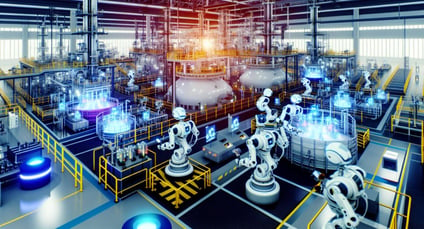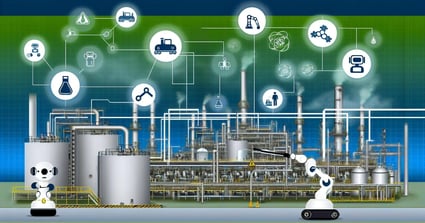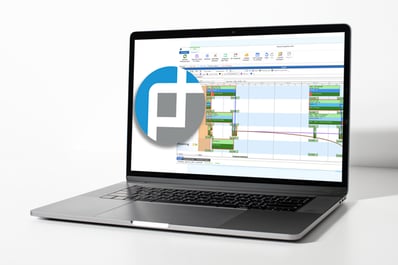Autonomous Inspection Systems in Chemical Manufacturing
For Purchasing Managers, maintaining stringent quality standards while optimizing processes is an ongoing challenge. Traditional quality assurance methods often involve manual inspections, which are not only labor-intensive but also prone to human error. However, with the advent of autonomous inspection systems, a new era of quality assurance is dawning upon the industry.
In this blog, we will explore the transformative potential of autonomous inspection systems in chemical manufacturing facilities. Moreover, we will delve into how integration between PlanetTogether, a leading production planning software, and prominent ERP, SCM, and MES systems like SAP, Oracle, Microsoft, Kinaxis, and Aveva, can enhance the effectiveness of these systems.

Autonomous Inspection Systems
Quality assurance is non-negotiable in chemical manufacturing. Product defects not only jeopardize customer satisfaction but can also have severe implications for safety and compliance. Traditional inspection methods, reliant on manual labor, are inherently limited. Human inspectors may overlook defects, tire with repetitive tasks, or succumb to subjectivity.
Autonomous inspection systems offer a solution to these challenges. By leveraging cutting-edge technologies such as artificial intelligence (AI), machine learning (ML), computer vision, and robotics, these systems can conduct thorough and consistent inspections with precision and efficiency unmatched by human inspectors.

Key Benefits of Autonomous Inspection Systems
Improved Accuracy: Autonomous inspection systems can detect defects with unparalleled accuracy, significantly reducing the likelihood of overlooking quality issues.
Enhanced Efficiency: By automating the inspection process, these systems can operate around the clock, accelerating the pace of quality assessment and enabling faster time-to-market for products.
Cost Savings: While the initial investment in autonomous inspection systems may be significant, the long-term cost savings are substantial. Reduced labor costs, minimized rework, and decreased scrap contribute to a healthier bottom line.
Data-driven Insights: These systems generate vast amounts of data during inspections. By analyzing this data, manufacturers can gain valuable insights into production processes, identify trends, and proactively address quality concerns.

Integration with PlanetTogether and ERP, SCM, and MES Systems
Now, let's delve into the integration aspect. PlanetTogether, renowned for its advanced production planning capabilities, serves as the linchpin in orchestrating manufacturing operations. By integrating with ERP, SCM, and MES systems such as SAP, Oracle, Microsoft, Kinaxis, and Aveva, PlanetTogether creates a seamless ecosystem wherein autonomous inspection systems can thrive.
Real-time Data Exchange: Integration facilitates real-time data exchange between PlanetTogether and ERP, SCM, and MES systems. This ensures that production plans are synchronized with inventory levels, customer orders, and supply chain dynamics, enabling autonomous inspection systems to prioritize inspections based on demand fluctuations and resource availability.
Streamlined Workflow: With integrated systems, the workflow from production planning to quality assurance becomes streamlined. PlanetTogether generates optimized production schedules considering constraints and objectives, which are then seamlessly communicated to autonomous inspection systems for execution. Any deviations or quality issues identified during inspections are promptly communicated back to production planners for adjustment, ensuring minimal disruptions to the manufacturing process.
Continuous Improvement: Integration enables a closed-loop feedback mechanism wherein insights gleaned from autonomous inspections can inform future production planning and process optimization efforts. By leveraging the data generated by these systems, manufacturers can iteratively refine their operations, driving continuous improvement in quality and efficiency.
Compliance and Traceability: In industries like chemical manufacturing, compliance with regulatory standards and traceability of products are paramount. Integration between PlanetTogether and ERP, SCM, and MES systems ensures that quality assurance processes are documented and traceable, facilitating compliance audits and regulatory reporting.
Autonomous inspection systems represent a paradigm shift in quality assurance for chemical manufacturing facilities. By harnessing the power of technology and integration with leading production planning and enterprise systems like PlanetTogether, SAP, Oracle, Microsoft, Kinaxis, and Aveva, manufacturers can elevate the quality of their products while optimizing operational efficiency.
As a Purchasing Manager, embracing autonomous inspection systems and advocating for their integration with existing systems can position your organization at the forefront of innovation, driving sustainable growth and competitive advantage in the dynamic landscape of chemical manufacturing.
Are you ready to take your manufacturing operations to the next level? Contact us today to learn more about how PlanetTogether can help you achieve your goals and drive success in your industry.


